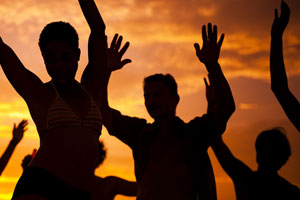Spring break is a tradition fueled by sunshine, alcohol, and — on occasion — rowdy behavior. Panama City recently passed ordinances that, according to their proponents, are meant to “tone down” disturbing behavior during spring break.
Some of the city’s nightclub owners are challenging those ordinances in federal court, claiming that they are motivated by racial bias. The nightclubs have enlisted an expert witness to decode the explanations that city officials have offered in support of the new laws.
Panama City Ordinances
Publicity about bad behavior during spring break prompted a response from Panama City officials that nightclub owners and related businesses do not welcome. The incidents that motivated the response include an allegation of sexual assault on a crowded beach, the non-fatal shootings of seven people at a house party, an altercation after a concert involving Mississippi State’s quarterback, and increasing numbers of arrests for firearms possession.
To address spring break crime, city officials passed ordinances that prohibit drinking on the beach and in commercial parking lots and that ban the sale of alcohol after 2:00 a.m. The ordinances are in effect only during the month of March.
The most controversial ordinance places restrictions on “special events,” including concerts. The ordinance requires city approval of special events and restricts the number of people who can attend them.
Business Owners File Lawsuit
Some Panama City businesses, including nightclubs, contend that the new ordinances will hurt their businesses. They filed a lawsuit seeking compensation for their losses.
Among other legal challenges to the ordinances, the businesses allege that the ordinances are racially motivated. According to their federal court complaint, the ordinances coincide with an increase in African-Americans who visit Panama City during spring break. The complaint states that “officials have suggested that spring break is now rife with ‘predators’ and other ‘interlopers’,” language that allegedly refers to African-Americans.
Perhaps the strongest evidence of racial bias is the claim that city officials told club owners to stop hosting hip-hop events because they attracted too many black attendees. In apparent response to those allegations, the city recently amended the “special events” ordinance to prohibit the city manager “from denying any permit based upon the identity of any speaker or entertainer or the viewpoint, content, or type of speech or expression to be displayed so long as such speech or expression is lawful.” In other words, the city cannot give less favorable treatment to hip-hop events than to other music events based on the content of the performance.
Expert Opinion
To support its claim of racial bias, the businesses bringing the lawsuit plan to present the expert testimony of Moneque Walker-Pickett, an associate professor of criminal justice at St. Leo University. Walker-Pickett based her preliminary report on a review of minutes from city council meetings at which the ordinances were discussed, and on the extensive coverage of Panama City’s “spring break problem” by Fox News. The businesses argue that Fox News’ coverage depicted African-Americans in an unfavorable light and that the coverage influenced the passage of the ordinances.
According to Walker-Pickett, the council used “color-blind” or racially neutral language to mask conscious and subconscious racial bias. Walker-Pickett opined that the council’s frequent references to “undesirables” and “unintended guests” were code words for African-American visitors. She also cites:
- Televised references by local police to the “hundred milers,” a coded reference to members of ethnic groups living within a hundred miles of Panama City, who (according to the police) travel to Panama City to “prey upon” the spring break visitors.
- Screenshots from Fox News and other media sources that overwhelmingly depict African-Americans while commentators are discussing criminal activity in Panama City during spring break.
- Council members’ repeated reference to media coverage and other adverse publicity during discussions of the proposed ordinances.
- Council members’ use of other code words, including “thugs,” “ghetto,” “trashy,” and “bad element” as substitutes for “African-Americans.”
- The use of code words like “good kids,” “fine kids,” “responsible,” and “college kids” to refer to white students who traveled to Panama City for spring break.
Based on her review of the evidence, Walker-Pickett concluded that racial bias played a role in the implementation of Panama City’s spring break ordinance.
The report was filed in opposition to a motion to strike claims from the complaint concerning racial bias. It has not yet been subjected to a Daubert challenge, which will doubtless be forthcoming if the racial bias claims survive the pending motion.




